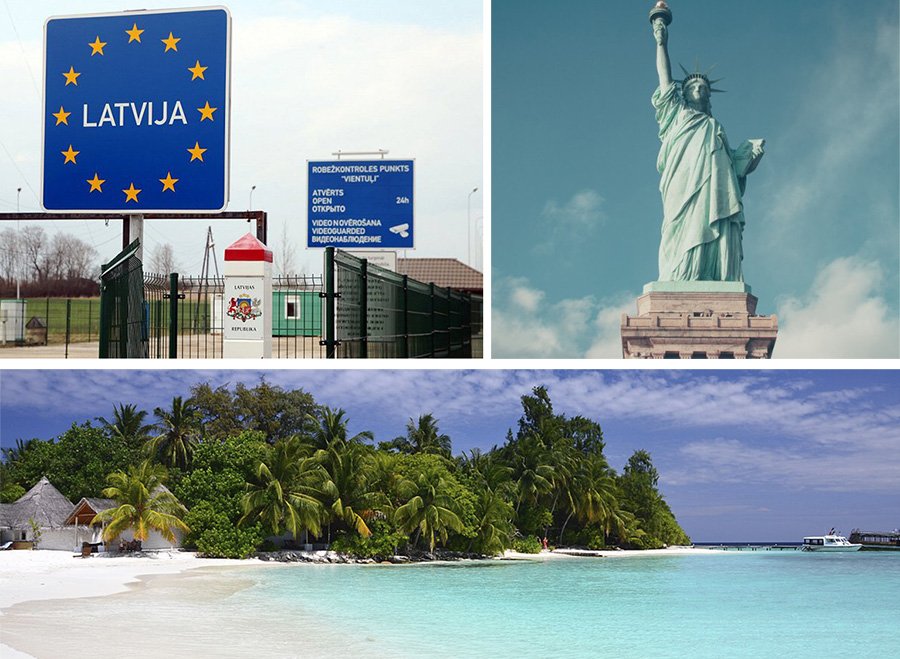Migration News of the Week: Who the Maldives Welcome and Where Foreigners Are No Longer Wanted

Some countries are opening new opportunities for foreigners by offering residency programs, while others are tightening entry rules and rolling back visa-free travel. Russians remain at the center of many processes—often as unwelcome guests or less visible players in real estate markets.
Latvia Requires Entry Forms
Starting September 1, 2025, Latvia tightens entry rules for third-country nationals without visas or Latvian residence permits. Russians, Belarusians, Ukrainians, and Georgians must complete an online entry form at eta.gov.lv at least 48 hours before travel, providing travel purpose, route, dates, and political or state activity information. Responses arrive within two days. Even transit travelers must comply, for example, a Belarusian with Polish residency or a Ukrainian heading to other EU countries. Intelligence services will check the data, entry may be denied, and fines apply for false information.
Russians have not been welcome in Latvia since February 2022, with restrictions piling up, forcing many to leave after years of residence. The new rules do not apply to EU, NATO, OECD, EEA, Swiss, or Brazilian citizens.
U.S. Introduces Mandatory Visa Interviews
From September 2, 2025, most U.S. nonimmigrant visa applicants must attend in-person
interviews. Previous waivers for children under 14 and seniors over 79 are abolished.
The rule applies to students (F, M), exchange visitors (J), skilled workers on H-1B, as well as tourists and business travelers (B-1/B-2). For students, this means longer timelines and uncertainty, raising concerns at universities that U.S. attractiveness may decline compared to Canada, the UK, and Australia. H-1B holders face complications when renewing or changing jobs, as mandatory interviews risk delays and disrupted family plans.
Exemptions include diplomatic/official visas and holders of recently expired B-1/B-2 visas if issued when the applicant was over 18 and expired less than a year ago. Still, consular officers may impose interviews at their discretion.
Poland Pushes to Scrap Visa-Free Travel for Four States
Poland is considering restricting visa-free entry for citizens of Colombia, Georgia, Armenia, and Venezuela. Deputy Interior Minister Czeslaw Mroczek cited rising migration violations and security threats.
Visa-free entry for Colombian workers was already canceled in 2024 after arson attacks allegedly linked to Russian intelligence. Authorities now highlight growing illegal employment and crime among Georgians and Armenians. Venezuela was singled out due to Russian influence.
Poland wants all Schengen states to adopt the measure—an unlikely outcome. Past proposals, such as banning Russians, also failed to gain EU-wide approval.
Maldives Residency Opportunity
Since July 22, 2025, the Maldives offers a five-year residency permit for investors. Required investments range from €250,000 to €100 million, including real estate, bank deposits, businesses, and special economic zones. Residency does not require physical presence, and applications can include multigenerational families. No income tax applies.
However, only leasehold property is available, and only Muslims who have lived in the country for ten years may apply for citizenship. Israelis are excluded. The program, run with Henley & Partners, includes source-of-funds checks.
Russians Sharply Cut Home Purchases in Serbia
Russians have
ceased to drive the Serbian housing market. In 2022–2023, they were the largest foreign buyers, driving up prices. In 2025, they account for less than 5% of deals. Transactions have stalled in Belgrade, although prices remain inflated. Prime districts still fetch €5,000–5,500 per sq. m, while affordable neighborhoods offer properties at €2,000–2,500.
Between 2020 and 2024, Serbia’s Interior Ministry recorded 104,987 Russian residence permits. Over 492,000 unique Russian passports were logged at borders during 2022–2024.
Digital Barriers
While technology creates unprecedented mobility opportunities, states increasingly use it to enforce control. Instead of open borders, digital filters and stricter frameworks are emerging. Foreigners are often treated as potential risks. Monitoring updates is key to knowing where doors are opening—and where they are shutting.
Подсказки: migration, visas, Latvia, USA, Poland, Maldives, Serbia, Russians abroad, real estate, residency programs, immigration policy








